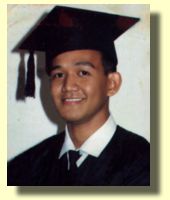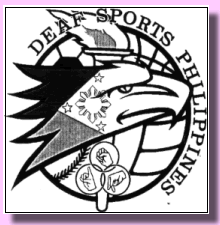

Mr. Ervin R. Reyes, A Pioneer in Philippine Deaf Computer Education
Thus said Ervin R. Reyes, MCCID Deaf Coordinator for more than six years. He has encountered numerous companies and agencies that seem to be unaware of the enormous capabilities of the Deaf. They only focus on their "disability" and not think of their potential for the progress of their companies.
His experience about discrimination among hearing people never started in
his home. He was blessed
Her mother cannot accept that Ervin is deaf. "What would happen to him
when he grows up?" She just cried and cried for many days praying to
God about his son. But eventually, through the support of his father Mr.
Demetrio Reyes and his brothers and sisters, they were able to accept his
condition. He grew up very much loved and well taken cared. In his school days he studied at the now Philippine School for the Deaf (formerly National School for the Deaf and Blind) in Pasay City. He was just an average student enjoying the normal life of being with deaf friends. In college, he was one of the pioneer students in the newly established CAP College School for the Deaf. He took up Associate in Information Technology course together with other 12 deaf. It is in that school where he met Jojo who was a computer instructor there. MCCID
started out with 11 hearing impaired This is where his burden to his fellow Deaf has taken shape. Why do companies give a hard time when it comes to accepting the Deaf? What more skills do they need? When he learned that the industry needs people who can type 12,000 keystrokes per hour, he trained the Deaf with 17,000 keystrokes per hour. When they require to know Windows, he trained learning Word, Excel, Access and Powerpoint. "We don't have big schools like for the Deaf like University of the Philippines or De la Salle University but we can do it on our own." "If the hearing person walks, then the Deaf need to run. If the hearing wakes up at 7:00 am, the Deaf should wake up at 6:00 am." To even be equal with the hearing world, the Deaf need to exert more effort even with less than one sense, the sense of hearing.
Aside from enhancing their skills, Ervin also advises them concerning their spiritual life and integrating values at work in his every lesson. Thus, MCCID honors this wonderful pioneer in computer education who has helped many Deaf in the Philippines. |

Deaf Sports Philippines, Empowering Filipino Deaf Through Sports
Armed with very meager resources financially and of manpower, the Deaf Sports Philippines was able to hurdle such obstacles. Twice in a row, DSP held a National Olympic Games for the Deaf, first in Lucena City, Quezon last July 1998 and second at Teachers Camp in Baguio City, the summer capital of the Philippines. They were both very successful. It was attended by delegates from as far as Cagayan De Oro City and Davao City in Mindanao. In participating for this event, DSP adheres with the rules of Comite International des Sports des Sourds (International Committee of Sports for the Deaf as well as the National Games of the Deaf's rules. All participants must also be endorsed by his/her organization/ high school or college. This year, the Deaf participated in sports events like track and field (individual), volleyball and basketball for men and women. These are considered as regular sports. Chess and table tennis competitions were also held but are only for exhibition. Organizers informed the participating delegates that by year 2000, the two exhibition sports would automatically become part of the regular competition. DSP is also under the supervision of the Philippine Sports Commission and is considered as one of their flagship projects designed to for people with specific disabilities. Programs of DSP through National Games for the Deaf include: 1. Sports which are played in the Asia/Pacific and World Games for the Deaf; 2. Sports which are not included but are popularly played in the country. The purposes of establishing DSP are: 1. To show equality among Deaf people to the ordinary person; 2. To encourage every Deaf individual to join in the Sports League for the Deaf; 3. To develop their individual skills regarding national or international competition with Deaf player qualifications and; 4. To promote unity among Deaf community to be good and friendly with other schools and organizations. Recently, the DSP was on the news when they issued statements regarding the inability of government agencies to fully support the organization and all their activities. To read the complete story, please view the News Tab or click here.. Officers of DSP MR.
CHRISTOPHER BRIX L. GREGORIO
Contact him at: gregorioc@csb.dlsu.edu.ph MR.
SIMEON HART
You can contact DSP at: The Secretariatc/o PHILSPADA Office, Philsports Complex (formerly ULTRA) Building E - Room 101, Meralco Avenue Pasig City, Metro Manila Tel. Nos.: (632)633-84-22 Fax Nos.: (632)636-48-84 |

 with such caring and wonderful family. As the sixth child among seven, "Papu"
as he was fondly called because it's the only word that he can say, has three
more brothers and two sisters. The first time his mother noticed about his
disability was when he was almost two years old. Mrs. Clarita Reyes started worrying
about his hearing impairment when one New Year's day, as everybody was covering
their ears due to loud bangs and booms, her son was very much comfortable
sleeping. Even though he was born from a poor family, her mother tried her best
to spend money on hospitalization and treatment for Ervin.
with such caring and wonderful family. As the sixth child among seven, "Papu"
as he was fondly called because it's the only word that he can say, has three
more brothers and two sisters. The first time his mother noticed about his
disability was when he was almost two years old. Mrs. Clarita Reyes started worrying
about his hearing impairment when one New Year's day, as everybody was covering
their ears due to loud bangs and booms, her son was very much comfortable
sleeping. Even though he was born from a poor family, her mother tried her best
to spend money on hospitalization and treatment for Ervin. 
 students. Six years later, MCCID graduated
more than a hundred Deaf and is currently training 47 more. He is always
with Jojo observing companies and learning what skills they need to achieve in
order to be accepted by them.
students. Six years later, MCCID graduated
more than a hundred Deaf and is currently training 47 more. He is always
with Jojo observing companies and learning what skills they need to achieve in
order to be accepted by them. In 1998, Manila Christian Computer Institute for the Deaf recognized the
tremendous effort that Ervin did to the Deaf community by awarding him a plaque
of appreciation, his first ever. He has trained more than 20 Deaf who are
currently working at Nova Management Corporation, 2 for Cybersoft Inc., two at
Ayala Foundation Inc. and three from LTA, Inc. including one as one of the staff
of Philippine Vice President Gloria Macapagal-Arroyo.
In 1998, Manila Christian Computer Institute for the Deaf recognized the
tremendous effort that Ervin did to the Deaf community by awarding him a plaque
of appreciation, his first ever. He has trained more than 20 Deaf who are
currently working at Nova Management Corporation, 2 for Cybersoft Inc., two at
Ayala Foundation Inc. and three from LTA, Inc. including one as one of the staff
of Philippine Vice President Gloria Macapagal-Arroyo.  Founded only in 1998, Deaf Sports Philippines already created a great impact on
the Sports activity of the Deaf youth in the Philippines. They have
organized two National Games for the Deaf and are currently preparing for the
National Capital Region Sports League. They are also preparing for the
Asia/Pacific as well as World Olympics for the Deaf in 2002.
Founded only in 1998, Deaf Sports Philippines already created a great impact on
the Sports activity of the Deaf youth in the Philippines. They have
organized two National Games for the Deaf and are currently preparing for the
National Capital Region Sports League. They are also preparing for the
Asia/Pacific as well as World Olympics for the Deaf in 2002.